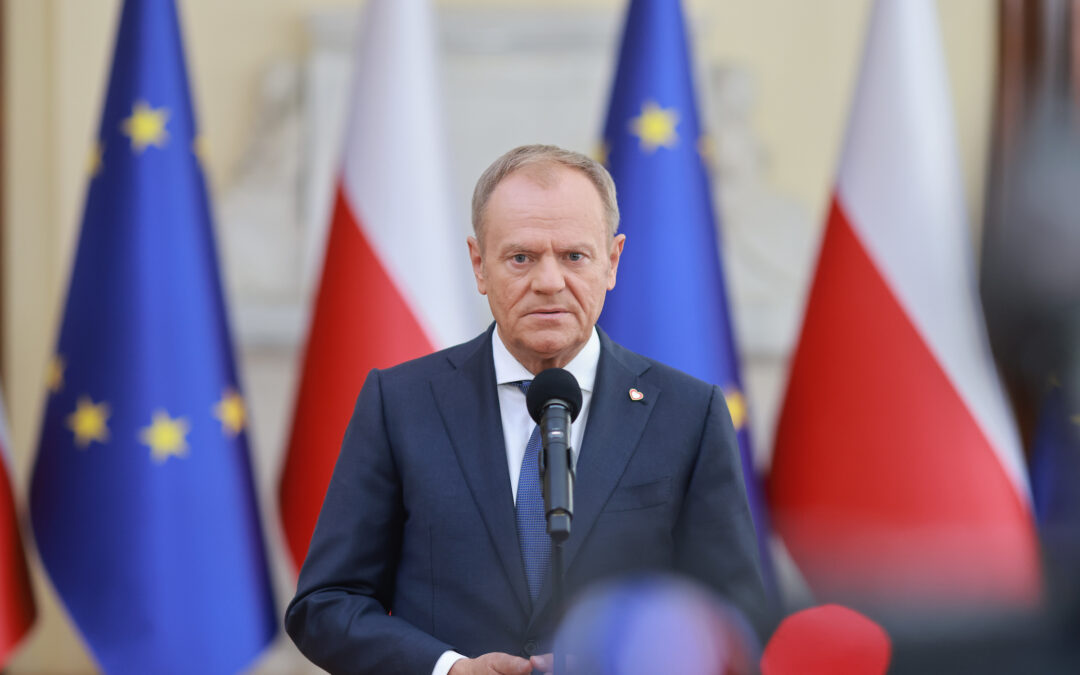Poland’s prime minister, Donald Tusk, has announced that he and other European leaders will in the coming days present details of a “pan-European air defence” system that he has labelled an “iron dome”.
On Monday, the European Investment Bank (EIB) announced €300 million of backing for Poland to create an earth observation satellite system. The bank noted that this was part of its new efforts to “support Europe’s security and defence industry.”
“This is a significant amount, thanks to which our plan to build an iron dome over Poland and Europe has again moved a step forward,” said Tusk on Monday, speaking alongside EIB president Nadia Calviño in Warsaw.
“Satellite and reconnaissance systems will be an essential part of this project, which I will present together with other European prime ministers in a few days,” added the prime minister. “The idea of pan-European air defence will become less and less a dream and more and more a real, practical plan.”
🎥 Umowa, jaką dzisiaj podpisaliśmy, dotycząca polskiego programu satelitarnego we współpracy z Francją. Mówimy tu o 300 milionach euro, dzięki której nasz plan budowy żelaznej kopuły nad Polską i nad Europą znowu posunął się o krok do przodu – Premier @DonaldTusk. pic.twitter.com/lrlNoH6dnN
— Kancelaria Premiera (@PremierRP) May 20, 2024
Later, in an interview with broadcaster TVN, Tusk said that he and his Greek counterpart Kyriakos Mitsotakis are preparing a joint letter addressed to EU institutions regarding the need for a joint air defence initiative.
“Slowly, [even] the most cautious and sceptical leaders are beginning to understand that if we are to talk seriously about Europe’s security and military strength, we must start with this dome, because then the European advantage over Russia – financial, economic and technological – will find its full expression,” said Tusk.
“This must be a joint venture” in order to “eliminate unwise competition between member states”, he added.
Poland is interested in joining a project to create an "iron dome" air-defence system in Europe, PM @donaldtusk has told Danish counterpart Mette Frederiksen during a meeting in Warsaw https://t.co/WzAtjvUdj2
— Notes from Poland 🇵🇱 (@notesfrompoland) April 16, 2024
Last month, Tusk expressed interest in joining a pan-European air defence project during a meeting with his Danish counterpart Mette Frederiksen.
“Denmark along with Germany and the UK are cooperating on a European anti-missile and anti-aircraft defence system,” said Tusk at the time, adding that Frederiksen had “responded positively to my intention for Poland to join this project”.
The European Sky Shield Initiative (ESSI), to give it its official title, was launched by German Chancellor Olal Scholz in 2022 with the participation of 15 European states, all of which are in NATO. Further countries have since joined the initiative.
Defence Minister #Pistorius: We welcome 🇬🇷 and 🇹🇷 as new members of the European Sky Shield Initiative #ESSI, which now has more members, greater security and lower costs. The conclusion of a purchase contract with Slovenia for an IRIS-T SLM firing unit is a further achievement. https://t.co/pWYWTbe5jS
— Germany at NATO (@GermanyNATO) February 15, 2024
The plans have, however, been met with criticism from Poland’s main opposition party, Law and Justice (PiS), which refused to join ESSI while it was in office until December last year.
It argues that Poland should focus on its existing air defence plans, put in place when PiS was in power, rather than joining an “expensive and time-consuming” new project, as PiS chairman Jarosław Kaczyński described ESSI last weekend.
Some in PiS have also suggested that ESSI is intended, above all, to benefit Germany. It “favours the German arms industry”, said Mariusz Błasczak, the former PiS defence minister, last month.
“Can we afford to finance two systems, including the German one, the so-called European one, which is much more expensive and much less advanced than the Polish system?” asked Błaszczak at the time.

Notes from Poland is run by a small editorial team and published by an independent, non-profit foundation that is funded through donations from our readers. We cannot do what we do without your support.
Main image credit: Kancelaria Premiera / flickr.com (under CC BY-NC-ND 2.0 DEED)

Daniel Tilles is editor-in-chief of Notes from Poland. He has written on Polish affairs for a wide range of publications, including Foreign Policy, POLITICO Europe, EUobserver and Dziennik Gazeta Prawna.



















